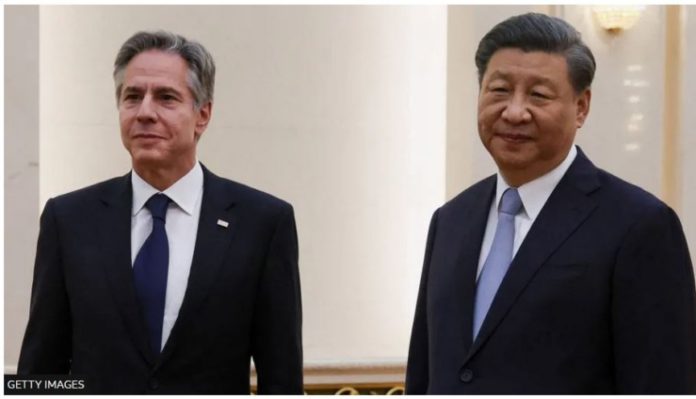China has accused the US of sending “a gravely wrong signal” to those pushing for Taiwan’s independence after Saturday’s election result.
US Secretary of State Antony Blinken sent Taiwanese president-elect William Lai a message of congratulations following the result.
Beijing called the message a violation of Washington’s commitment to maintain only unofficial ties with Taiwan.
Mr Lai has vowed to protect Taiwan from an increasingly aggressive China.
But Beijing sees Taiwan as its territory and fiercely challenges any government that says otherwise.
Messages of congratulations for Taiwan’s new leader poured in from all over the world after the election, including from Mr Blinken – who emphasised the partnership between Taipei and Washington, which he said was rooted in democratic values.
“We look forward to working with Dr Lai and Taiwan’s leaders of all parties to advance our shared interests and values,” he said in a statement.
Mr Blinken also stressed that the US, one of Taiwan’s biggest allies, is “committed to maintaining cross-strait peace and stability”.
The top US diplomat was also quick to say that such collaboration should “further our longstanding unofficial relationship” and be “consistent with the US One China policy”.
Under the policy, the US recognises and has formal ties with China rather than the island of Taiwan, which China sees as a breakaway province to be unified with the mainland one day.
Mr Blinken’s remarks drew sharp criticism from Beijing, which views any statement of support for Taiwan as lending legitimacy to a candidate and political party it sees as a gang of separatists hoping to turn Taiwan into an independent sovereign nation.
In a statement, China’s foreign ministry said Mr Blinken’s congratulations violated the US’s promise to maintain “only cultural, commercial, and other unofficial relations” with Taiwan.
It stressed that the Taiwan question is “the first red line that must not be crossed in China-US relations” and said it had lodged a formal diplomatic complaint.
“China firmly opposes the US having any form of official interaction with Taiwan and interfering in Taiwan affairs in any way or under any pretext.”
Beijing’s statement will likely serve as a warning to Washington after it sent an unofficial delegation of former US officials to hold talks with leading political figures in Taiwan just hours after the self-ruled island elected Mr Lai.
Deployed by US President Joe Biden, who himself welcomed the election results, the delegation includes a former US national security adviser and a former deputy secretary of state.
Other Western countries, including the UK, France and Germany, congratulated the new leader.
Beijing’s Communist government reviles Mr Lai’s pro-sovereignty Democratic Progressive Party (DPP), which has governed Taiwan for eight years.
That is because China sees any statement of support towards the DPP as lending legitimacy to politicians, which Beijing sees as a gang of separatists hoping to turn Taiwan into an independent sovereign nation.

